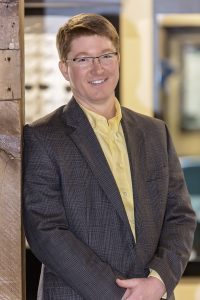Bryan M. Stoller, OD
 Born and raised in Fairbury, Dr. Stoller resides in rural Chenoa with his wife, Kara. They have 3 children and 3 grandchildren. “Our children are like arrows. After years of training and sharpening, we release them knowing they will have an impact in the lives of people who my wife and I may never meet. It has been a joy watching that happen.”
Born and raised in Fairbury, Dr. Stoller resides in rural Chenoa with his wife, Kara. They have 3 children and 3 grandchildren. “Our children are like arrows. After years of training and sharpening, we release them knowing they will have an impact in the lives of people who my wife and I may never meet. It has been a joy watching that happen.”
Dr. Bryan Stoller has gathered his knowledge with the following achievements in education: graduated with a Bachelor of Science in Biology from the University of Illinois, graduated with a Doctorate of Optometry with Honors in 1998 from The Ohio State University, and he is Board Certified with the American Board of Optometry. He belongs to the following associations: American Optometric Association, Illinois Optometric Association (Executive Council 2007-2009), and Bloomington Regional Optometric Society (President 2007-2009).
Dr. Stoller enjoys the opportunity to practice a number of eye care specialties due to Livingston County’s rural location. Dr. Stoller has developed a strong interest in diabetic eye care, serving on the OSF St. James Diabetes Advisory Board. His practice includes numerous patients with glaucoma and macular degeneration. In recent years Dr Stoller has taken a more comprehensive approach to the treatment of Dry Eye Syndrome and now guides his patients through the challenges of this chronic condition. Dr. Stoller has been a promoter of myopia management for many years, successfully slowing the progression of nearsightedness for many children.
Dr. Stoller has been a promoter of myopia management for many years, successfully slowing the progression of nearsightedness for many children.
Dr Stoller loves to travel and gain new cultural experiences. He co-established the Eye Care Clinic in Ixtlan, Michoacan, Mexico, as part of the mission efforts of Apostolic Christian Harvest Call. Most recently he has assisted with the eye care program at Hospital Lumiere in Haiti. He has also performed eye exams in Zambia and Ethiopia as part of a partnership between the Rotary Club of Pontiac and Lifesong for Orphans.
Although he has chosen optometry as his life’s career, Dr. Stoller has passed on a family legacy of agriculture to his children. While his children were in school, their family operated a small two acre farm raising chemical free produce, most of which was purchased by chefs in Chicago. “It was a tremendous opportunity for our children to learn the value of work, the benefit of income and the reality of expenses, as well as communicating and providing a quality product. These lessons will stick with them throughout their lives.”
